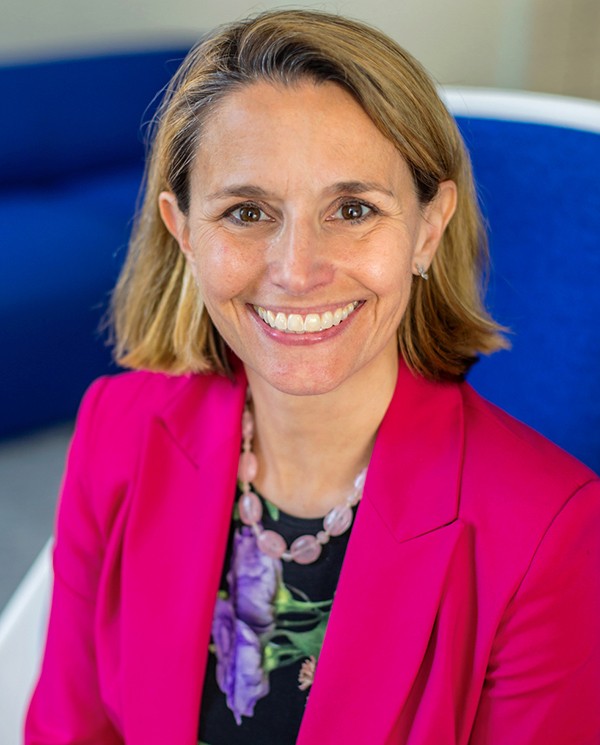Rachel Dunifon reappointed dean of College of Human Ecology
By James Dean, Cornell Chronicle
Rachel Dunifon has been appointed to a second term as the Rebecca Q. and James C. Morgan Dean of the College of Human Ecology, Provost Michael I. Kotlikoff announced Sept. 26.
The Cornell Board of Trustees’ Executive Committee voted Sept. 14 to approve a new five-year term, effective July 1, 2024.
“Rachel has led the College of Human Ecology through a dynamic period that has established vibrant new departments and partnerships, welcomed diverse new faculty and advanced the college’s mission to improve human health and well-being,” Kotlikoff said. “As the college nears its 100th anniversary in 2025, it is well-positioned to launch a second century of interdisciplinary and engaged scholarship addressing society’s pressing needs.”
A professor in the Department of Psychology and the Cornell Jeb E. Brooks School of Public Policy whose research focuses on child and family policy, Dunifon said she is honored to continue the leadership role she began on an interim basis in 2018 and permanently in 2020.
“Human Ecology is the home of trailblazers who tackle the most pressing challenges to human lives,” Dunifon said. “I am proud of all that we have accomplished and am excited to lead the college as we carry out our mission of improving lives in every context, from cells to societies.”
The college is home to 139 faculty members, 166 staff, more than 1,000 undergraduates and nearly 200 graduate students, as well as centers and institutes including the Bronfenbrenner Center for Translational Research. With the College of Agriculture and Life Sciences, Human Ecology leads Cornell Cooperative Extension system programming throughout New York state related to nutrition, youth development and strengthening families.
Early in her tenure, Dunifon led the development of “Vision 2030,” a new strategic plan that unified the college’s scholarship around the themes of health equity; sustainability and society; and technology and human health.
Additional accomplishments to date include:
- The recruitment of more than one-third of the college’s tenured and tenure-track faculty, including a cohort focused on social justice.
- The creation of the several new departments, including the Department of Human Centered Design, whose transdisciplinary faculty include three members who have received National Science Foundation Early Career Development Awards; establishing the multicollege Department of Psychology; and partnering in the multicollege Department of Design Tech.
- Deepening the college’s commitment to public engagement as an inaugural Engaged College, designated by the David M. Einhorn Center for Community Engagement, and through new Engaged Faculty Fellowships. Dunifon further advanced that priority as the inaugural winner of the William T. Grant Foundation’s Institutional Challenge Grant, which challenges institutions of higher education to connect research to impact. Dunifon launched the Action Research Collaborative, which serves as a hub and resource for faculty working with communities in New York City.
- Achieving the college’s strongest-ever fundraising year. Recent investments include new endowed professorships, capital funding for new cross-college design makerspaces, new fellowships in the Bronfenbrenner Center, and more than three-dozen new undergraduate scholarship funds as part of the university’s “to do the greatest good” campaign.
In another recent milestone, Dunifon led the multimillion-dollar renovation to the college’s historic home in Martha Van Rensselaer Hall, which was awarded LEED Gold certification and – in a Cornell “first” – recognized for inclusive design. Dunifon said the renovated 1933 building is a manifestation of how the college honors its past while continuing to evolve, defined by its commitment to interdisciplinary scholarship and public engagement.
“You need that interdisciplinary perspective to tackle the most challenging issues related to human health and well-being,” she said. “Our problems don’t come in neat little boxes, and our solutions won’t either.”
Moving forward, Dunifon’s goals include faculty recruitment; enhancing the college’s curriculum; expanding opportunities for students and faculty in New York City; and fostering cross-campus collaborations.
In addition to her role as dean, Dunifon co-directs Cornell Project 2GEN, which addresses the needs of at-risk children and their parents, including research focused on upstate New York families affected by the opioid epidemic. Her research on the role of grandparents in children’s lives builds on her 2018 book, “You’ve Always Been There for Me: Understanding the Lives of Grandchildren Raised by Grandparents.”
Prior to joining Cornell and the College of Human Ecology in 2001, Dunifon completed a postdoctoral fellowship at the University of Michigan School of Public Policy. She earned a bachelor’s degree in psychology from Davidson College in 1994, and a doctorate in human development and social policy from Northwestern University in 1999.
Media Contact
Get Cornell news delivered right to your inbox.
Subscribe

